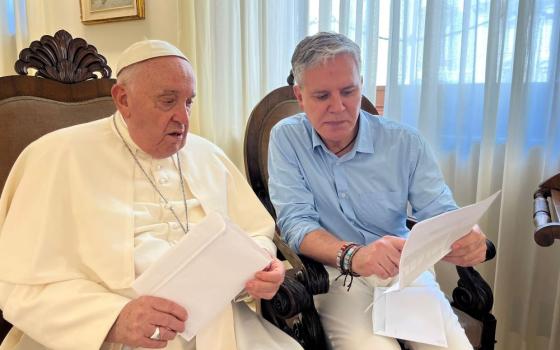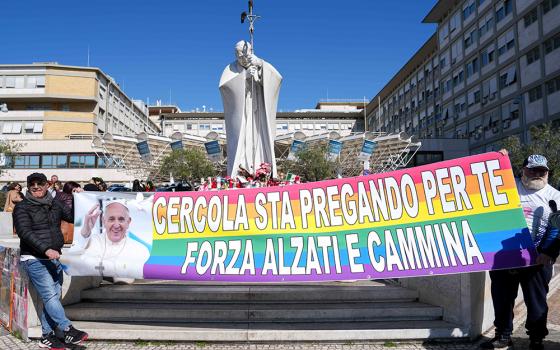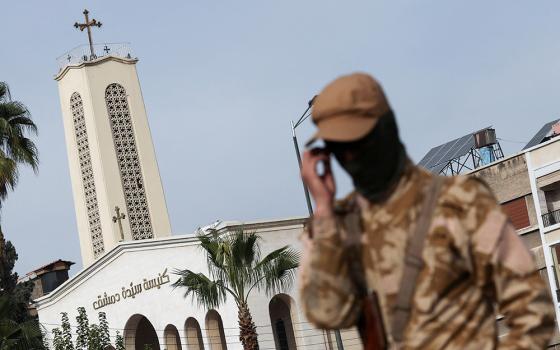
Janusz Szymik claims that between the years of 1984 and 1989 he was sexually abused almost 500 times by Fr. Jan Wodniak in the village of Międzybrodzie Bialskie, Poland, about two hours southeast of Krakow. Pictured is the church in Międzybrodzie Bialskie, St. Mary Magdalene parish, in 2007. (Wikimedia Commons/Petrus Silesius)
Editor's note: The following is a condensed version of a report first published in Poland by the web portal Onet.pl, which has specially authorized its translation for NCR readers.
Cardinal Stanislaw Dziwisz, the Polish bishops, and the Vatican's ambassador in Poland are responsible for the case of Janusz Szymik, a long-time victim of the abusive priest Fr. Jan Wodniak. Why does the injured person have to fight for justice for over 25 years, and still waits?
The question, still hanging open, raises difficult issues for the Vatican, as Dziwisz was Pope John Paul II's trusted secretary for 27 years before serving as the Archbishop of Krakow from 2005 to 2016.
Szymik claims that between the years of 1984 and 1989 he was sexually abused almost 500 times by Wodniak in the village of Międzybrodzie Bialskie, about two hours southeast of Krakow.
"It lasted so long, because I was a child who was cornered by him, lived in a snare, because there was nobody to turn to for help, and Wodniak knew it perfectly well," Szymik explained to me, adding that due to the experience he came close to committing suicide.
From 1992 forward, the village in which Szymik was abused became part of a new diocese, Bielsko-Zywiec, which was established by John Paul. It was headed by one of the Holy Father's closest associates: Bishop Tadeusz Rakoczy. This name is worth remembering as it will prove crucial to the whole story.

Janusz Szymik at 12 years of age (Courtesy of Janusz Szymik and Onet.pl)
"In 1993, I went to Bishop Rakoczy, hoping that he would be on the side of the victim, not the abuser. I wrote down my memoirs from the period of 1984 to 1989. Neither the bishop nor anyone else from the bishop's curia ever contacted me about this matter," recalled Szymik.
When Szymik found out that Rakoczy did not intend to take any action in this matter, he decided to report to the prosecutor's office, although he also encountered the influence of his tormentor there.
"Immediately after giving the testimony, my boss at the time visited me and ordered me to withdraw it ... I did so because I was afraid of losing my job," Szymik said, years later.
I checked whether the case Szymik was talking about had ever actually been brought to the prosecutor's office. The press spokesman of the District Prosecutor's Office in Bielsko-Biala, Agnieszka Michulec, confirmed this fact.
I read in response:
Janusz Szymik's notification was registered with the District Prosecutor's Office in Zywiec on June 18, 1993. It was established that the proceedings were conducted in the direction of a crime under Art. 168 of the former Penal Code and concerned Jan Wodniak and that it was completed with a decision to discontinue on August 2, 1993.
Szymik later saw evidence that Wodniak was still interested in young boys and decided to report the matter to Rakoczy again. He went to him in 2007 in the presence of a witness, but again Rakoczy did not help him.
The situation in 2007 was completely different from that in 1993. In 2001, John Paul II had promulgated the motu proprio Sacramentorum sanctitatis tutela, which outlined how the Vatican's Congregation for the Doctrine of the Faith was to investigate allegations of abuse by Catholic clergy.
"I went to him and presented my report from 1984 to 1989, when I was abused," Szymik says of the 2007 meeting with Rakoczy. "Later I found out that my notes were placed in the hands of Cardinal Stanislaw Dziwisz. Nobody from the Krakow curia contacted me."
I talked about that situation with Fr. Tadeusz Isakowicz-Zaleski, a priest in the Archdiocese of Krakow.

Polish Cardinal Stanislaw Dziwisz of Krakow, Poland, arrives for a consistory in St. Peter's Basilica at the Vatican, June 28, 2018. (CNS/Paul Haring)
"In April 2012, I came to the Krakow Curia and handed over to Cardinal Dziwisz documents containing the precisely described case of Janusz Szymik and his contact details," explained the priest, who also founded the Brother Albert Foundation, one of the Poland's largest non-profit groups helping those who are physically or mentally disabled.
"[Dziwisz] said that it was a matter for Bishop Rakoczy, but at the same time he assured that he would move it forward. As it turns out, nothing like that happened," said Isakowicz-Zaleski.
In 2020, I wrote to Dziwisz to ask if he had received information about a possible cover-up by Rakoczy in the case of Wodniak.
"The answer is negative. During the time when I was the Archbishop of Krakow, I never received any news that anyone reported to Bishop T. Rakoczy allegations about Fr. Jan Wodniak, which Bishop Rakoczy would not have dealt with in accordance with the applicable legal norms," read the reply, signed by Dziwisz.
He added:
I answer not only based on memory, but also after checking in the relevant registers of the Metropolitan Curia, where there is no trace of correspondence from anyone on the subject given by you. As the Metropolitan of Krakow, I strictly followed the rule that each letter is not only registered, but also that each letter is answered.
Dziwisz, papal secretary
The figure of Cardinal Dziwisz is key to understanding the whole story. In 1966, this clergyman became the chaplain and secretary of the then-Archbishop of Krakow, Karol Wojtyla, and remained so until the end of Wojtyla's life. When Cardinal Wojtyla became Pope John Paul II in 1978, Dziwisz moved with the newly elected Holy Father from Krakow to the Vatican.
After John Paul II died on April 2, 2005, Pope Benedict XVI made Dziwisz himself the Archbishop of Krakow. During the cardinal's service in Krakow, several scandals related to the priests from that archdiocese were revealed. These cases were widely covered by the Polish media. In most of these cases, the court found the clergymen guilty.
However, in order to better understand how Dziwisz acted when it comes to the topic of abuse among the clergy, one has to go back to the times when he worked alongside John Paul II in the Vatican.
Back in February 2007, the Italian daily La Stampa reported that then-Archbishop Dziwisz, as the personal secretary of the pope, was hiding documents on sexual abuse of seminarians among the clergy.
The case concerned the founder of the Legionaries of Christ, Mexican Fr. Marcial Maciel Degollado, and the retired Archbishop of Poznan, Poland, Juliusz Paetz. Further questions have since been raised about Dziwisz's role in promoting U.S. Cardinal Theodore McCarrick, who has now been accused of sexual misconduct with young men and has been laicized.
The fact that John Paul and his closest circle allegedly knew about abusive behavior among the clergy and did not react has been repeatedly pointed out by Dominican Fr. Tom Doyle, who in the mid-1980s prepared various reports on clergy sexual abuse. These studies were handed over to John Paul, but the tragic situation did not improve.
"Although in 2012 there was no such legal obligation as Metropolitan, Cardinal Dziwisz should react when a bishop who is subordinate to him covers up such crimes," canon lawyer Piotr Szeląg told me. "He could already report the whole matter to the Vatican then, but he did not do so."
Interestingly, in an interview given eight years ago to the Italian daily La Repubblica, Cardinal Dziwisz said, "The pope did very well to speak out with such determination on the abuse scandal. In the matter of this tragedy, the work of purification is being continued, with all severity initiated by John Paul II."
Why then did he not react firmly to Rakoczy's negligence?
After being credibly told there are witnesses who remembered the events from eight years ago differently than the former papal secretary, I asked Dziwisz about the case again earlier this year. I received a statement from Fr. Czesław Bogdała, his assistant, that "my words are a provocation and the cardinal will not meet me, and will pass our correspondence to his lawyers."
Advertisement
Rakoczy, Vatican's Poland expert
Szymik's case also indicates many years of cover-up by Rakoczy. Why is it so important?
Before John Paul II appointed Rakoczy to lead the Diocese of Bielsko-Zywiec, "Fr. Tadeusz Rakoczy was one of the closest associates of Pope John Paul II in the years between 1978 and 1992," pointed out Fr. Andrzej Kobyliński, a philosophy professor at Cardinal Stefan Wyszynski University in Warsaw.
The priest also mentioned the important role that Rakoczy played for the Polish church at that time.
"John Paul II created a separate Polish Section for our country in the Vatican. Its main creators were: Fr. Tadeusz Rakoczy and Fr. Jozef Kowalczyk, later apostolic nuncio in Warsaw and the primate of Poland," said Kobyliński.
"The Polish Section of the Vatican Secretariat of State made most of the most important decisions regarding [the trade union] Solidarity, martial law, Gorbachev's perestroika, preparations for the Round Table talks, our model of political transformation in 1989, or the nomination of bishops in Poland," he continued.
The following facts also seem particularly important in terms of the whole history: Rakoczy and Dziwisz studied together at the Krakow seminary from 1957 to 1963 and were both ordained priests by the then-Archbishop of Krakow, Karol Wojtyla.
In February 2014, Szymik had the first meeting with the new bishop of the Bielsko-Zywiec Diocese, when Szymik explained exactly what crimes Wodniak had committed against him.
Bishop Roman Pindel started the proceedings to check into the accusations made by Szymik. Consequently, he removed Wodniak from the parish he had been serving. The priest was then found guilty by the Vatican's Congregation for the Doctrine of the Faith of abusing a minor.
In April 2015, Wodniak was sentenced to deprivation of all church offices and was restricted from performing priestly ministry. However, he appealed against that judgment, and he admitted only to a dozen or so sexual contacts.
The final penalty of five years was issued in December 2017. The reduced sentence was signed, among others, by Cardinal Zenon Grocholewski and Archbishop Charles Scicluna.
At the end of 2018, Pope Francis announced he would convoke a summit in February 2019, calling all the presidents of the world's bishops' conferences to come to Rome to discuss clergy sexual abuse.
As part of the meeting, Francis urged bishops to meet with victims of abuse. What Francis ordered, the head of the Polish episcopate, Poznan Archbishop Stanisław Gadecki, did.

Polish bishops attend a news conference to release the church's first clerical sex abuse report March 14, 2019. In zucchettos, from left, are Bishop Artur Mizinski, secretary-general of the Polish bishops' conference; Archbishops Marek Jedraszewski of Krakow; Stanislaw Gadecki, bishops' conference president; and Wojciech Polak of Gniezno. (CNS/Reuters/Adam Stepien, Agencja Gazeta)
"Our meeting took place on May 14 in Warsaw," recalled Szymik. "I presented my case once again, having basically no hope that this meeting will change anything."
However, it is worth looking at the dates. On May 9, 2019, Francis publishes a new motu proprio, Vos estis lux mundi, which makes clear that bishops must report suspicions of abuse or its cover-up. On May 14, Szymik tells Gadecki about his situation, mentioning Rakoczy and Dziwisz as those who had knowledge of the subject and did nothing.
Vos estis lux mundi came into force on June 1, 2019. Why did Gądecki not implement the papal instructions on June 1 and report the possible cover-up to the Vatican?
"These meetings had pastoral and private character and because of that their contents were neither recorded nor archived," I was told by the Polish bishops' press office. "They were organized at the request of Pope Francis."
"Again, we can talk about moral neglect," canon lawyer Szelag commented to me.
After the 2019 meeting with Gądecki, Szymik once again decided to take matters into his own hands.
"In the letter of July 9, 2019, addressed to the Apostolic Nuncio, Archbishop Salvatore Pennacchio, I drew attention to the deliberate and conscious hiding of the criminal acts of Fr. Jan Wodniak by Bishop Rakoczy," Szymik explained. "I expressed my hope that the good of the church is the good of the victims and not of abusers and their promoters."
As it turned out, however, this letter also remained unanswered. After more than seven months of waiting, another letter on the same matter is sent to the Apostolic Nuncio.
Finally, came the answer. It confirmed the receipt of the correspondence of July 9 and assured that "the Nunciature dealt with the matter immediately" and asked for the necessary investigation into the Szymik's claims by the Diocese of Bielsko-Zywiec.
When I myself sent questions to the Apostolic Nunciature to determine when exactly the Nunciature received information about the possible cover-up by Rakoczy, I received only an unsigned response: "proceedings are underway under the motu proprio Vos estis lux mundi."
When I tried to find out by phone why no one will sign the nunciature's letters, a woman at the office, who also refused to introduce herself, first hung up on me and then suggested that my questions were inappropriate.
Only in June this year, the victim, who had reported the case to the Nunciature almost a year earlier, was informed that the Vatican had appointed the Archbishop of Krakow, Marek Jedraszewski, to conduct a preliminary investigation. I sent questions to his press office about the status of the investigation, but I have not received an answer.
Szymik calls for papal inquiry
After the publication of my initial reporting, Piotr Greger, the auxiliary bishop of the Bielsko-Zywiec Diocese, announced officially for the first time that Wodniak had been found guilty and was sentenced with a final judgment. (News of 2015's sentencing and 2017's reduced verdict had never been made public.)
Later that same day, I managed to talk for a while with Greger, who from the very beginning dealt with Szymik's case. The bishop, however, denied this. "It's not true," Greger replied. "When this case was reported, I was not yet a bishop. I have never been on any committee and I have never questioned anyone."

Janusz Szymik's liturgical ministry identity card (Courtesy of Janusz Szymik and Onet.pl)
Szymik remembered these events in a completely different way and accused the bishop of having lied. "The bishop questioned me, my wife and another witness," Szymik told me. "Please check the minutes of our hearings, which were signed by Bishop Greger."
Greger later issued a statement in which he admitted that he had recalled all the facts about which I had asked him. He informed me that in this case he had received a reprimand from his superior.
"This attack was inspired by Fr. Isakowicz-Zaleski," Dziwisz told the Gazeta Wyborcza, one of Poland's largest newspapers, on Sept. 11.
"Therefore, it seems a good solution to set up an independent commission to investigate that matter," the former papal secretary announced. "I declare my will to cooperate with such a commission. I will also take steps to meet personally with Mr. Janusz Szymik."
Szymik told me: "I don't understand why Cardinal Dziwisz didn't meet with me in 2012, and he was silent for eight years. If after 2012 anyone was sexually abused by Fr. Wodniak, the responsibility for these victims is on the side of Cardinal Dziwisz."
Adds Isakowicz-Zaleski: "For many people Cardinal Dziwisz is still a big authority, who is now being tested. If it is confirmed that he knew about these matters and he didn't want to deal with it, many will find that the king is naked."
On Oct. 8, Szymik published a letter on Onet.pl, asking Francis to appoint an independent commission to investigate Dziwisz's historic handling of his case.
"Unfortunately, after 27 years of fighting for justice, I have lost faith that the Polish bishops are able to deal with the problem of sexual abuse," wrote Szymik. "I am asking you, Holy Father, to appoint an independent commission and to clarify my case as soon as possible."
[Szymon Piegza is a polish journalist and editor at Onet.pl. He is also a contributor to Newsweek.pl, Holistic.News, and Forbes.pl. His email is: szymon.piegza@redakcjaonet.pl.]





